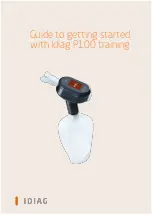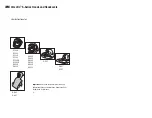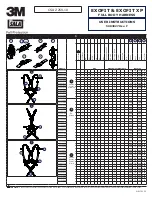
TF.G4.2.28.14
31
dosage should be reduced. Thyroid hormone therapy in patients with concomitant diabetes mellitus or diabetes insipidus or adrenal cortical
insufficiency aggravates the intensity of their symptoms. Appropriate adjustments of the various therapeutic measures directed at these
concomitant endocrine diseases are required. The therapy of myxedema coma requires simultaneous administration of glucocorticoids (See
DOSAGE AND ADMINISTRATION). Hypothyroidism decreases and hyperthyroidism increases the sensitivity to oral anticoagulants. Prothrombin
time should be closely monitored in thyroid-treated patients on oral anticoagulants and dosage of the latter agents adjusted on the basis of
frequent prothrombin time determinations. In infants, excessive doses of thyroid hormone preparations may produce craniosynostosis.
Information for the Patient
— Patients on thyroid hormone preparations and parents of children on thyroid therapy should be informed
that: 1. Replacement therapy is to be taken essentially for life, with the exception of cases of transient hypothyroidism, usually associated
with thyroiditis, and in those patients receiving a therapeutic trial of the drug. 2. They should immediately report during the course of therapy
any signs or symptoms of thyroid hormone toxicity, e.g., chest pain, increased pulse rate, palpitations, excessive sweating, heat intolerance,
nervousness, or any other unusual event. 3. In case of concomitant diabetes mellitus, the daily dosage of antidiabetic medication may need
readjustment as thyroid hormone replacement is achieved. If thyroid medication is stopped, a downward readjustment of the dosage of insulin
or oral hypoglycemic agent may be necessary to avoid hypoglycemia. At all times, close monitoring of urinary glucose levels is mandatory in
such patients. 4. In case of concomitant oral anticoagulant therapy, the prothrombin time should be measured frequently to determine if the
dosage of oral anticoagulants is to be readjusted. 5. Partial loss of hair may be experienced by children in the first few months of thyroid therapy,
but this is usually a transient phenomenon and later recovery is usually the rule.
Laboratory Tests
— Treatment of patients with thyroid hormones requires the periodic assessment of thyroid status by means of appropriate
laboratory tests besides the full clinical evaluation. The TSH suppression test can be used to test the effectiveness of any thyroid preparation
bearing in mind the relative insensitivity of the infant pituitary to the negative feedback effect of thyroid hormones. Serum T4 levels can be
used to test the effectiveness of all thyroid medications except T3. When the total serum T4 is low but TSH is normal, a test specific to assess
unbound (free) T4 levels is warranted. Specific measurements of T4 and T3 by competitive protein binding or radioimmunoassay are not
influenced by blood levels of organic or inorganic iodine.
Drug Interactions
— Oral Anticoagulants —
Thyroid hormones appear to increase catabolism of vitamin K-dependent clotting factors.
If oral anticoagulants are also being given, compensatory increases in clotting factor synthesis are impaired. Patients stabilized on oral
anticoagulants who are found to require thyroid replacement therapy should be watched very closely when thyroid is started. If a patient is
truly hypothyroid, it is likely that a reduction in anticoagulant dosage will be required. No special precautions appear to be necessary when oral
anticoagulant therapy is begun in a patient already stabilized on maintenance thyroid replacement therapy.
Insulin or Oral Hypoglycemics
— Initiating thyroid replacement therapy may cause increases in insulin or oral hypoglycemic requirements.
The effects seen are poorly understood and depend upon a variety of factors such as dose and type of thyroid preparations and endocrine
status of the patient. Patients receiving insulin or oral hypoglycemics should be closely watched during initiation of thyroid replacement therapy.
Cholestyramine —
Cholestyramine binds both T4 and T3 in the intestine, thus impairing absorption of these thyroid hormones. In vitro
studies indicate that the binding is not easily removed. Therefore four to five hours should elapse between administration of cholestyramine
and thyroid hormones.
Estrogen, Oral Contraceptives
— Estrogens tend to increase serum thyroxine-binding globulin (TBg). In a patient with a nonfunctioning
thyroid gland who is receiving thyroid replacement therapy, free levothyroxine may be decreased when estrogens are started thus increasing
thyroid requirements. However, if the patient’s thyroid gland has sufficient function, the decreased free thyroxine will result in a compensatory
increase in thyroxine output by the thyroid. Therefore, patients without a functioning thyroid gland who are on thyroid replacement therapy may
need to increase their thyroid dose if estrogens or estrogen-containing oral contraceptives are given.
Drug/Laboratory Test Interactions
— The following drugs or moieties are known to interfere with laboratory tests performed in patients on
thyroid hormone therapy: androgens, corticosteroids, estrogens, oral contraceptives containing estrogens, iodine-containing preparations, and
the numerous preparations containing salicylates. 1. Changes in TBg concentration should be taken into consideration in the interpretation
of T4 and T3 values. In such cases, the unbound (free) hormone should be measured. Pregnancy, estrogens, and estrogen-containing oral
contraceptives increase TBg concentrations. TBg may also be increased during infectious hepatitis. Decreases in TBg concentrations are
observed in nephrosis, acromegaly, and after androgen or corticosteroid therapy. Familial hyper- or hypothyroxine-binding-globulinemias have
been described. The incidence of TBg deficiency approximates 1 in 9,000. The binding of levothyroxine by TBPA is inhibited by salicylates.
2. Medicinal or dietary iodine interferes with all in vivo tests of radio-iodine uptake, producing low uptakes which may not be relative of a
true decrease in hormone synthesis. 3. The persistence of clinical and laboratory evidence of hypothyroidism in spite of adequate dosage
replacement indicates either poor patient compliance, poor absorption, excessive fecal loss, or inactivity of the preparation. Intracellular
resistance to thyroid hormone is quite rare.
Carcinogenesis, Mutagenesis, and Impairment of Fertility
— A reportedly apparent association between prolonged thyroid therapy and
breast cancer has not been confirmed and patients on thyroid for established indications should not discontinue therapy. No confirmatory
long-term studies in animals have been performed to evaluate carcinogenic potential, mutagenicity, or impairment of fertility in either males
or females.
Pregnancy — Category A
— Thyroid hormones do not readily cross the placental barrier. The clinical experience to date does not indicate any
adverse effect on fetuses when thyroid hormones are administered to pregnant women. On the basis of current knowledge, thyroid replacement
therapy to hypothyroid women should not be discontinued during pregnancy.
Nursing Mothers —
Minimal amounts of thyroid hormones are excreted in human milk. Thyroid is not associated with serious adverse
reactions and does not have a known tumorigenic potential. However, caution should be exercised when thyroid is administered to a nursing
woman.












































